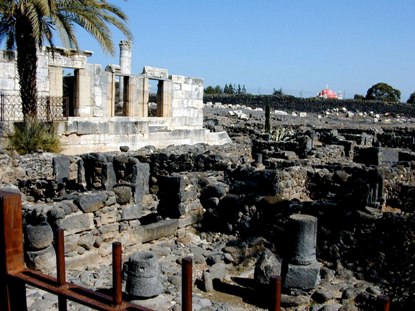|
HellHades Hades is a Greek word translated as “hell” 10 times, and “grave” 1 time in the New Testament. It is simply the Greek equivalent of the Hebrew word sheol. To prove it, look at these verses: Psalm 16:10 – For thou wilt not leave my soul in hell (sheol); nether wilt thou suffer thine Holy One to see corruption. (KJV, comment added) Acts 2:27 – Because thou wilt not leave my soul in hell (hades), neither wilt thou suffer thine Holy One to see corruption. (KJV, comment added) So here Acts quotes Psalm 16, so we know the meaning is the same, and word for hell is hades instead of sheol. This is can be confirmed by Strong’s Hebrew Dictionary which defines sheol as “hades, or the world of the dead.” Next, look at Matthew: Matthew 11:21-24 – Woe unto thee, Chorazin! woe unto thee, Bethsaida! for if the mighty works, which were done in you, had been done in Tyre and Sidon, they would have repented long ago in sackcloth and ashes. But I say unto you, It shall be more tolerable for Tyre and Sidon at the day of judgment, than for you. And thou, Capernaum, which art exalted unto heaven, shalt be brought down to hell (hades): for if the mighty works; which have been done in thee, had been done in Sodom, it would have remained until this day. But I say unto you, That it shall be more tolerable for the land of Sodom in the day of judgment, than for thee. (KJV, comment added)
In verse 24, Jesus compares several cities. Capernaum was a small city on the coast of the Sea of Galilee (see picture above). Sodom was a city described in Genesis 18 and 19 which God destroyed because it was full of wicked men. The only righteous man in Sodom was Lot, whom God allowed to escape. Jesus says that Capernaum (along with Chorazin and Bethsaida) will suffer worse judgment than Sodom (along with Tyre and Sidon). Now if people from both cities were to suffer an eternal hell, how could there be a difference in judgment for them? Some may argue that there are levels in hell, like in the Divine Comedy. However, there is no evidence for this in the Bible. It is much more likely that this judgment is not eternal, and it is different for everyone depending on where they stand with God. Also, if hades was translated as grave, the whole passage would make much more sense. We get another clue from verses 21-23, where Jesus says that if the works that were performed in Capernaum were performed in Sodom, it would still remain. A better translation of “works” is “signs from God” or “miracles.” So Capernaum and Sodom may both have had a lot of wicked men, but only Capernaum had signs from God. Yet, Capernaum did not repent before God. So their judgment in the lake of fire will be worse than Sodom. Here’s one more verse: Revelation 20:14 – And death and hell (hades) were cast into the lake of fire. This is the second death. (KJV, comment added) This verse in Revelation clearly shows that hades and the lake of fire are not the same thing. A better translation for hades is the “state of being dead.” So God will destroy all causes of death, and the state of being dead.
Page 4 of 6 |
Subscribe to Bible Truth Newsletter:





